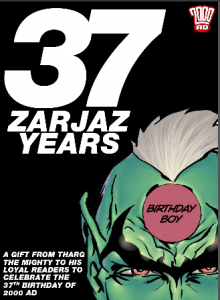Yesterday was the 37th anniversary of 2000 AD, a weekly British science fiction comic paper.
Back in the 1970s, the British comics market was doing quite well. There were many weekly papers, divided into children’s, boys’ and girls’ categories. Some then divided down into genres, such as comedy, war or sports. A science fiction movie fad convinced an editor at IPC that an SF-themed weekly comic for boys would sell well.
Given the vagaries of the British comics industry, which had titles failing all the time to be incorporated into more popular weeklies, the new book was named 2000 AD as there was little chance of it reaching that far future date. Previous experience had taught the team of Pat Mills and John Wagner that teens responded well to anti-authoritarian attitudes and authoritarian characters, even though their parents and the moral guardians deplored the former.
In keeping with the science fiction/future theme, the issues were called “progs” and the ostensible editor of the magazine, Tharg, was an alien from Betelgeuse who employed robots to write and draw the stories. The first prog led off with a revamped version of the classic Dan Dare series, plus M.A.C.H.-1 (a super-powered secret agent with a computer in his head that regulated his powers and sometimes took control), Flesh (time traveling cowboys herding dinosaurs), Invasion 1999 (Communazi invaders called Volgans take over Britain) and Harlem Heroes (an all-black team playing the futuristic sport of jetball.)
That last one was unusual for having black leads at a time when most comics shied away from them; it was later explained as not being a deliberately progressive choice so much as really being fans of the Harlem Globetrotters.
But what really set 2000 AD apart was a strip that didn’t start until the second issue due to needing more pre-production tweaking, Judge Dredd. This futuristic Dirty Harry with an element of black comedy quickly became the flagship character of the book, appearing in nearly every issue.
The comics tended to be quite violent, and this has continued for the most part to the present day. As it was a boys’ paper female characters were rare and marginalized in the early days. Once female readers, bored by the rather soppy girls’ comics of the time, started coming in, this caused a running feud in the letters page with many male fans complaining that girls were invading their special space.
Things have gotten better on the sexism front since, although traces of laddishness still crop up in the current stories. Due to the different censorship laws in Britain, female toplessness does happen from time to time–parents be advised.
Many now-famous British writers and artists got their first big break from 2000 AD, including Brian Bolland and Alan Moore. There’s plenty of great art and snappy writing to be found in the various stories, along with some clinkers.
Despite some rough times, especially in the late 1990s, 2000 AD has managed to survive the collapse of the British comics industry and continues to publish weekly. May they have many zarjaz years to come!

